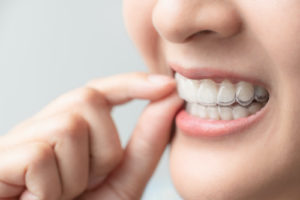At Lovett Dental Sharpstown, we are always happy to solve dental issues with minimal invasion. When possible, it is a healthy mode of treating patients. That is why we frequently prescribe nightguards for patients facing several specific issues. Nightguards can treat issues without any medication or surgery. They provide a passive solution, and we’re happy to explain more about what problems they treat and how they help.
a healthy mode of treating patients. That is why we frequently prescribe nightguards for patients facing several specific issues. Nightguards can treat issues without any medication or surgery. They provide a passive solution, and we’re happy to explain more about what problems they treat and how they help.
Teeth Grinding
Grinding your teeth at night is a common problem for dental patients. Medically, the condition is known as bruxism. Teeth grinding can disrupt sleep, cause mouth pain, generate headaches, damage teeth, and contribute to other medical and dental issues. While there is no specific known cause of bruxism, many medical professionals associate it with anxiety and chronic poor sleep.
Bruxism is exacerbated when any of the following accompanies it:
- Smoking or other nicotine consumption
- Caffeine, especially at night
- Sleep apnea
- Snoring
Because of the close link between sleep quality and bruxism, treating one issue is always paired with treating the other. Resolving bruxism can improve your sleep and come with many health benefits. Sometimes, the reverse order works, and bruxism is cured by resolving sleep issues. For this reason, caffeine and cigarettes are usually discussed first when diagnosing and treating bruxism.
Nightguards for Bruxism
The best way to deal with grinding issues is with a nightguard. As the name implies, this is a dental guard that goes on your teeth and interferes with the grinding action. The dental barrier reduces strain on your jaw and protects your teeth — diminishing the harmful effects of grinding. Nightguards for bruxism are the most common treatment option. They do not require a prescription and can bring fast relief to your mouth and jaw.
TMJ Disorder and How Lovett Dental Sharpstown Can Help
Bruxism is not the only medical condition related to jaw clenching. Temporomandibular joint disorder can be excruciating and involves problems with the jaw muscles and joints. Severe cases can cause the jaw to lock involuntarily (commonly known as lockjaw syndrome). This can cause extreme facial pain, difficulty chewing, headaches, sleep disruption, and discomfort across the head and face.
TMJ comes in a range of severities. Some cases are mild and resolve on their own within a few days. Other cases can be chronic and require direct intervention. If you think you have TMJ, gauge your symptoms. Mild discomfort does not necessitate immediate attention, but if the problem gets worse or doesn’t go away, you need help. You can always call and discuss the issue or schedule an appointment to ensure you get the proper care.
Nightguards for TMJ
Like with bruxism, night guards for TMJ are a great solution that can bring fast relief, especially considering teeth grinding is a common contributor to TMJ. Unlike with bruxism, nightguards are not always the right solution. TMJ can exist without accompanying bruxism. In those cases, supplemental treatments are often necessary. Nightguard treatments are often paired with physical therapy and oral medications that help reduce contributing factors and address the pain and discomfort that accompany the condition.
In worst-case scenarios, surgical treatments may be prescribed to resolve TMJ. The surgery can address specific problems in the muscles, nerves, or joint, and only with direct intervention can the TMJ be fully and properly treated.
Learn More About Nightguards from Lovett Dental Sharpstown
If you face bruxism, TMJ, or any other dental issues, Lovett Dental Sharpstown is here to help. You can make an appointment with us by calling 281-975-5560. We’ll get you in as soon as possible to get you on a path to treatment and relief. We offer emergency dental services, and you can always refer to our emergency checklist for advice on how to deal with emerging dental problems.
